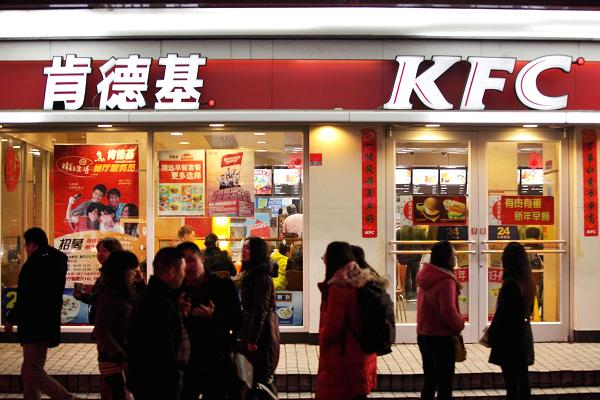9 Major Changes That Have Happened In China Recently
It's a lot to digest.
Throughout 2017, the Chinese government has made quite a number of changes to the way things are run in the country
The following list features several of the major changes that have been implemented from as early as the first quarter of the year.
1. Major websites have been barred from live streaming
In June, Chinese authorities ordered Weibo, iFeng, and ACFUN, three major online platforms, to stop all its video and audio streaming services.
China’s State Administration of Press, Publication, Radio, Film and Television said that all three sites had lacked the license to stream content.
The ban was enforced as part of the government's efforts to tighten its oversight of content on the Internet. The ban likely came into rule because live streaming generally can't be regulated as well as other content on social media since there is no real way to control what home broadcasters say live to their audience.
Last year, China also banned people from filming themselves eating bananas in a 'seductive' fashion.
2. Game developers are now forced to reveal loot box odds
On 1 May 2017, a new law came into effect that forced game developers to publicly reveal their game's loot box drop rates.
Loot boxes are packages in many popular games such as Dota and League of Legends that contain mystery items that are supposed to enhance a player's gaming experience. Users generally have to use real money to purchase the boxes and have no real way of knowing if they'll be satisfied with the items inside. It could almost be compared to gambling.
China's new ruling now requires game developers to fully disclose the probabilities of getting different items in a single loot box.
Gamers around the world are a little satisfied with the ruling, hoping it gives game developers an incentive to increase the chances of a decent reward in their loot boxes. However, it is likely that the rates revealed will only apply to the Chinese versions of the games.
3. Imports of soft cheese have been banned
Imports of soft cheeses have been banned by Chinese custom officials for containing "too much bacteria". The authorities were reportedly alarmed that the mould of the cheeses contained colonies of bacteria that had not been officially approved.
The ban affects mainly French and Italian cheeses like Brie, Camembert and blue cheese.
The new ruling is considered to have come out of nowhere considering that China has been safely importing and consuming European cheeses for decades.
4. A controversial cybersecurity law affecting businesses has been passed
Last year, the Chinese government approved a controversial new cybersecurity law, mostly affecting foreign businesses, that received criticism from business groups around the world.
The government says that the new law is meant to strengthen the protection of personal information and combat online fraud. One part of the law involves measures that allow the government to conduct security reviews of technology products and services that could affect national security. Critics of the new law call the plans "intrusive" and "trade-inhibiting". Experts also say it further strengthens the country's grip on the Internet.
However, despite the outbreak, the new law officially took effect on 1 June 2017.
Businesses who violate the ruling can have their licenses revoked and be fined up to 1,000,000 Yuan (RM639,008) or be detained for up to fifteen days.
5. Anonymous posts online are no longer allowed
On 25 August 2017, the Cyberspace Administration of China (CAC) released new regulations that are meant to stop posts or comments online by anonymous users.
According to the new set of regulations, Internet companies and service providers are now required to request and verify the real names of its users. They are also required to report any illegal posted content to the authorities.
A full list of the type of content China bans from being published online can be obtained here.
6. Pinterest has been blocked
In March of this year, Pinterest was added to the list of banned sites in China following other Western social media sites such as Facebook, Twitter and Snapchat.
According to Cho-Wen Chu, a professor at Taiwan's Chinese Culture University, it is likely that the site was blocked to allow local rivals to grow. He said, "China's 'national security' concerns may be only a convenient excuse to favor domestic dotcoms by impeding fair competition."
Banning Western rivals gives Chinese tech companies, such as Alibaba's Faxian, the ability to dominate the Internet.
7. ICOs have been banned
On 4 September 2017, China's central bank released a notice announcing an immediate ban on Initial Coin Offerings (ICOs).
ICOs are a fundraising tool that involve the creation and selling of new crypto tokens to investors. It is sometimes referred to as a 'crowdsale'.
China deemed it an "illegal fundraising practice" and said it had “seriously disrupted the economic and financial order.”
Two of China's largest platforms for buying into ICOs, ICOage and ICO.info have now already suspended their services and have begun taking on new projects.
8. Cryptocurrency exchanges have been shut down
Last Friday, Chinese authorities ordered all local cryptocurrency exchanges to stop new user registrations by midnight on 15 September 2017 and to publicly notify their users when they will formally close.
All cryptocurrency exchanges are also required to publish their plans to exit the market by 6pm Beijing time on 20 September. Some of the country's largest exchanges, including OKCoin, BTCChina and Huobi have already issued notices saying they would shut down all trading between bitcoin and the Chinese yuan.
It is unclear whether there are plans to re-launch cryptocurrency exchanges under new rules or if the ban is permanent.
There are also rumours that the Chinese government is building its own cryptocurrencies.
9. Customers can "smile to pay" at KFC
Alibaba’s affiliate, Ant Financial, teamed up with KFC to launch their new "smile to pay" service.
The service is exactly what it sounds like. It allows customers to process their payments at the outlet by simply smiling after placing their order.
The whole process takes place using the restaurant's self-serve screens that are equipped with 3-D cameras used to scan the customer's face.
The service is available to customers using the Alipay app – the payment platform established by Alibaba's founder, Jack Ma.








